To order copies of these books:
from the publisher: Watermark Publishing, Hawaii.
from Amazon: click on the book covers.
NEW
-
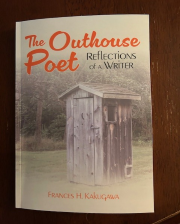
The Outhouse Poet
It began in the Kapoho outhouse. The outhouse was both my hideaway from household chores and my dream house, where fantasies of becoming a writer, a Hollywood actress and a literary celebrity were generated. Yelling "I stay in da toilet!"as loud as I could was my passport to freedom. I had perfected my yell as a means to be left alone when called to cook the rice or start the furo. (My father worked as a cane cutter in the sugar plantation fields, and the bath watter in the wooden tub had to be heated and ready for his return each day.)
~ ~ ~
One uncle often told me, a scrawny girl wearing loose home-made dresses to conceal her legs covered with Band-Aids over impetigo, "Someday you are going to be a beautiful woman." This may have fueled my dream of becoming a glamorous Hollywood star. My uncle didn't turn out to be a seer.
-
"Frances really does see into the human heart like few others, making the hidden-in-plain-sight secret world of retirees who gather at an ordinary shopping mall shine out to us with life's surge. This book brought me laughter, made me misty-eyed a few pages later, then brought laughter again, and warmth. If you haven't encountered Frances before, this introduction is a treat."
— Charles Pellegrino, PhD, author Ghosts of Hiroshima (soon to made into a film by James Cameron), and Her Name, Titanic"When author Frances Kakugawa invites you to meet her at the outhouse, you should go because you're in for a treat."
"She takes the stuff of real life and repurposes into words that live on in other forms."
"...discovering this book has been like finding an oasis in the midst of a barren desert."
— Kevin Kawamoto, Social Work Educator"She is known as the Poet Laureate of the Mall. It is a long way out of the outhouse."
—Dean Dorn, PhD, author Sociology with a Human Face
Outhouse Poet will be available soon:
check back here, or with Watermark Publishing
ON THE BOOKSHELF
-

Can I have Your Pearl Bracelet?
"How do you talk to people who are dying?" "I didn't really get it until my friend Gwen Lee put it altogether for me. I was waiting for a medical test and wondering if it would reveal I had cancer.
"Can I have your Ming's Pearl Bracelet?" Gwen asked.
In Can I Have Your Pearl Bracelet? award-winning author, poet and advice columnist Frances H. Kakugawa presents us with the story of first discovering who she is and then taking the difficult journey of becoming what she discovered. It takes a long time to do that and means changing your hopes to become older and wiser to a less certain heading of trying to become ageless and learning.
This rich anthology introduces a memorable cast of characters in adventures ranging from teaching in Micronesia and the pitfalls of publishing, to growing up Japanese in an Hawaiian village during the war, later buried by lava along with traces of your ancestors who were buried in Hiroshima, where the enemy wore her face. Insights are shared and lessons learned in Kakugawa's long career as an educator, writer, poet and sought-after speaker on subjects such as creative writing, children's poetry and eldercare.
"Frances Kakugawa knows how to talk the talk. She does so in her collections on teaching children, on healing caregivers, in her "Wordsworth the Poet" children's series and through her many volumes of poetry. But it is in her books of prize-winning memoirs that we most get to know she has also walked the walk.
"Can I Have Your Pearl Bracelet" describes what that walk has been like for her. If being somebody means being yourself, then the lessons to be learned from the stories in Pearl Bracelet will make it one of the best how-to books you can put on your shelves." —Red Slider -
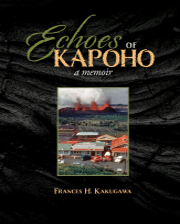
Echoes of Kapoho
When your town is buried in a million metric tons of lava, can you ever go home again? Could it matter to someone who spent her entire childhood planning her escape from that sleepy Hawaii plantation village where she grew up and the cane-bound roots that took up residence in her dreams of escape? In "Echoes of Kapoho", its author will travel great distances trying to escape those early barefoot days of living downslope from one of the world's most active volcanoes. A collection of marvelous plans for getaways to some distant land that she can only imagine but never quite reach.
It is no spoiler to say, no matter how far Frances goes to get away, home is never very far from reminding her where she came from. An enemy wearing her face is waiting just around the next corner; thoughts of running to the outhouse to avoid evening chores will prove of little value for bearing the burdens of adult responsibility; Madam Pele, goddess of fire, will always be waiting by the roadside in the dark, expecting a kind word and small gift, and woe to any who should fail to offer that much.
No matter how far she goes, the slopes of that active volcano are close by, along with a hundred other talkstory moments fueling her driving ambition that she would someday become a writer. The wonderful stories that unfold from the pages of Echoes are like the sounds of a distant shore on a tiny island that is never as far away as you might have once thought you wanted to get from it. Enchanting stories of growing up, and out, to remind us that home is the place that is always close behind, no matter how far one travels.
"Frances nails a whole world in these deftly told stories" — Mark Arax, journalist and author, The Dreamt Land, Chasing Water, Dust Across California."
"Frances is a fascinating writer, her stories compellingly intriguing" — George Takei, Actor, Human Rights advocate and activist.
To order these books:
from the publisher, click
here
from Amazon.com, click the book cover.
-
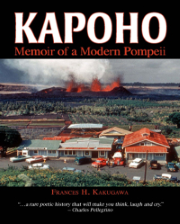
Kapoho - Making of a Modern Pompei
In Kapoho: Memoir of a Modern Pompeii, Frances H. Kakugawa shares the stories of her life in the town of Kapoho on the Island of Hawaii, a town that no longer exists. From the wartime drama of "The Enemy Wore My Face"—recalling her instant transformation to distrusted "Jap" after the bombing of Pearl Harbor—to the sweet poignancy of "A One-Chopstick Marriage"—the story of her parents' relationship —Kakugawa weaves a tapestry of memories drawn from life in a Hawaiian plantation village now buried beneath a blanket of lava.
"Kakugawa's amazing recall of details helps remind us of the beautiful innocence and naivete of youth and the realities of growing up poor in Hawaii, all too cognizant of the ethnic, linguistic and cultural barriers she would have to overcome to realize her literary dreams," says Guy Aoki, Founding President, Media Action Network for Asian Americans. Author Charles Pellegrino calls it "a rare poetic history that will make you think, laugh and cry all at the same time."
-
Commentary
In case you don't think abalones contain pearls, look again. Not often, but once in awhile.... Outside, Kapoho is a shell in a brilliant splash of rainbow colors—Filipinos, Hawaians, Japanese, kerosine lanterns, outhouses, Nakamura Store, soldier boys, hookers with red nails, haoles, Madam Pelê on the road at night, rivers of lava, sugar cane plantations, chopsticks in lunch boxes and a pearl of a kid who thinks if only she can shed herself of the pidg1n English she was born with she might escape into the world of Sears catalogs and book signings at Barns & Noble.
Absolutely fascinating, Inside the shell of Kapoho, you'll not only find a wannabe writer dreaming her Pulitzers, but eight lines of the most powerful anti-war poem written in the last century. Even backwater abalone villages produce pearls now and again. Well, they dream of doing it, and once in awhile.... Either way this 'gotta get outta here' collection of stories doubles its value."
— Out_of_the_Loop PressTo order this book:
from the publisher, click here
from Amazon.com, click the book cover.
POETRY
-

Dangerous Woman
There's nothing edgy or obscure in this collection of poetry by Frances Kakugawa spanning 60 years of her very active life. It's all there in plain sight. Stopping to chat on a sidewalk in Hilo, reading Sears catalogs in an outhouse, ignoring stop signs and detours, or on a kitchen table. Just stuff, laying around on porch steps clinging to a passing cloud, or in a grain of sand.
Things one would hardly notice until they trip over them and take a bad fall. To which this dangerous woman would remark, "Sorry, I'm on my way to my 88th birthday and I don't want to be late. All the good-looking men will be used up," she hollers over her shoulder. "I'll text an ambulance for you, but that's the best I can do."
We are the dangerous women...
Who never say no to sunsets, sunrises,
Evening strolls or double martinis.
Evening strolls or double martinis.
We are the women who speak to you
In supermarkets over apples and cabbages,
Making you wish you could follow us home.
We are so damn demanding
You wish we had never met,
Yet you know, we are the only poetry you have.
We are the women you should avoid
If you don't believe in Peter Pan,
And the first star of the evening skies.
But pour us wine as the sun sets low,
And we will hand you the key
To things you don't know.
An emotion, an idea, eyeing a plate of peas, viewing the face of a crumbling gravestone , taking a lemon's-eye view of the world, her poems are sometimes affectionate, sometimes downright caustic. Men—past, present or imagined—are in for a special treatment in this collection. Sometimes regarded with tender affection, sometimes with outright contempt, often leaving the reader struggling to tell which is which. In one poem, first-responders racing to rescue some unfortunate soul get only this passing remark from our dangerous woman,
"It's part of their job
You see,
And they get paid."
Poetry, on the other hand, always gets an unequivocal pass,
"If the pen
The tongue
The heart
Filled the air
With one song
What a symphony of truth!
Which is precisely what makes this poet a Dangerous Woman.
-
"My first book of poetry was published when I was in my 30s," Kakugawa tells us. "Fifty years later, I am still here. Who would have thought poems written in my youth would still speak to us today? My search for self, love, joy and meaning in life continues."
Many of the poems in "Dangerous Woman" are taken from previous published work, some are more recent. But all are the work of a dangerous woman and we caution, they can be slippery when wet.
I sit and watch
Each passerby
And see not people
But painted faces
Framed and fenced
Like canvassed Picassos
Each to another,
On surfaced lines
Unseeing, unfeeling
The hidden soul
Behind each smile.
A gallery of faces,
Cold, hard, yet
Highly prized
For each painted stroke.
Commentary
Forget raging agains the dying of the light. Oh, there's caustic asides along with melancholy, regret, stumbles and recoveries, enough for at least one box of kleenex. But raging? No time for that. Until the lights actually go out, Frances Kakugawa is much too busy with art of living, and writing a few poems along the way to keep us informed.
They probably didn't hear
About my 88th birthday
When I plan to make love and listen to leaves
On a windless day.
Instead of dying or raging, Frances Kakugawa will be telling us how to make a glass of lemonade from the lemon's point of view, admonishing the stars for not granting her wishes, or chasing another jar of watermelon pickles. Men, she will remind us, spend a lot of their nights "living in the wake of was." "They had their time," she writes, "They had their time." She's dangerous alright. But it's a quiet rage that breaks the surface of these poems. Much more dangerous than sound & fury signfying nothing.
Not that she's unmindful of her own mortality. She doesn't want to die, and comes right out and says so in a number of these poems. But it's not something she dwells upon. Things outside of her control are duly reported, but don't slow her down for a moment. She's got a lot of other things to do and reminds us all we best get on with it as well.
A morning glory twines,
covering
A
Chiseled
Name.
To order this book:
from the publisher, click here
from Amazon.com, click the book cover.
CAREGIVING & POETRY
-
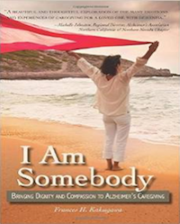
I Am Somebody
The challenges of Alzheimer's disease, the physical burdens, financial costs, emotional turmoil and family strife can reduce our loved one to a 'he' or a 'she,' a person almost devoid of humanity. As caregivers, our lives revolve around the basics, like doctor's appointments and dressing, feeding and cleaning up after our loved ones. Their life becomes our life; our life becomes theirs. But who are they now that this disease has taken over? And just as important, who are we? In I Am Somebody: Bringing Dignity and Compassion to Alzheimer's Caregiving, dignity-in-caregiving advocate Frances H. Kakugawa presents a new vision of caregiving.
I Am Somebody is a reminder that both loved one and caregiver deserve compassion, respect and a life with dignity. As a caregiver for her Alzheimer's-afflicted mother for many years, Kakugawa often felt embattled and at odds with her mother.
Through writing, she had a revelation. "I wrote a poem, from my mother's point of view, imagining what she would say: 'When I soil my clothing, or do something absurd, / Do not tell me, "Why didn't you?" / If I could, I would.' This idea came to haunt me and became my mantra whenever I wanted to shout in exasperation, 'Why did you?' or 'Why didn't you?'"
Commentary:
Being somebody under the best of circumstances isn't always the easiest thing to do. Being a caregiver for a loved one with dementia is hardly the best of circumstances. The thief of dementia is out to steal what they can of the somebody your loved one once was and reduce them to the shell of a nobody if it can. Day by it will try to peel off their identity layer by layer. That is the battle which the the caregiver confronts every day, more than any other. It is the essence of the mission of caregiving, to keep their loved one from becoming a Nobody. Death is shikata-ga-nai, something that cannot be helped. In the meantime, while the caregiver is on watch, insuring their loved one is and remains Somebody is exactly what they do. It is the essense of caregiving. It defines someone suffering from Alzeheimer's or other forms of dementia as Somebody.
In that process, a second front in that war goes almost unnoticed. The thief is not content with robbing the one cared for of their identity, it is also hard at work trying to rob the caregiver of their identity as well. Friends will visit less often and then not at all. Phone calls are mostly from doctors and pharmacies and social workers who aren't interested in what happend to you yesterday or how you feel about the dozen mistakes you will make today.
Until they are doing it, no one can know what always listening for a cry in the night, the thump of a fall, or checking to see if someone managed to slip out a door and disappear into the confusions of the world does to the one tending those matters. It is very hard to convey to someone who has not done it what it is like to spend the morning cleaning pooh off the bathroom wall, or the day without a single word of adult conversation.
Contacts the caregiver comes to have with the outside world are not even about them, they are about the other person who is also becoming more of a nobody as time goes on. The caregiver is dedicated to preventing that from happening; but who is preventing it from happening to the caregiver?
The question for me is
Will I? Will I? Ever?
Be able to accept all this
With serenity in the midst of my suffering?
—Sets Yoshida
-
Commentary (cont.)
Frances Kakugawa's "I Am Somebody" was born from the need to provide caregivers with a tool to do just that. No weapon a caregiver might use to push against being captured and pulled into the world of being a Nobody is more effective than to tell the story of what it is like to suffer the assaults of invisibility and to put the silent and inaudible in a form that can be examined and dealt with. It is most in the process of remembering who we are and of being somebody that humans receive the dignity and compassion to which everyone is entitled.
The caregiver does not relate such stories to tell the world as much as to tell themselves to pay attention—to themselves! It is why poetry (and other arts) is so important to the process. It is through poetry that we are able to say what otherwise cannot be said, the inside of our experiences which really have no words to express in any other form. "I Am Somebody" is a collection of stories and their poems, written by a group caregivers in one of France Kakugawa's workshops to assist them in avoiding the dementia of forgetting themselves, of slipping into the world of 'being nobody' along with their loved ones. When the group first started, none of the particpants knew each other, nor did the author know any of them. After the years of sharing their stories and poems many of them, including the author, became life long friends and sombodies to one another. In "I Am Sombody" some of the narratives and poems are supplied by Frances after many years of listening and hearing what the other members of the group had to say about their experiences. More important are the stories and poems the caregivers wrote and shared among themselves, telling in detail what caregiving is really like from inside those stories. Those are the ones no one else can tell about what it feels like and what one must do to prevent the prospect of becoming nobody. It is the poetry that does that, says what otherwise cannot be said. Those are the writings of caregivers telling themselves, reminding themselves, of the somebody they are and must not forget. What "I Am Somebody" offers the rest of us is a tool we can all use should the time come for our stewarding the fragile mortality of a loved one.
There is one question which every long-term family caregiver will face in one form or another, "Is there life after caregiving?" With such tools as Frances provided in her workshops and through writing this book, the answer is a definite, "Yes!"
-
Our humor is not normal anymore.
Hello. My name is Jody.
I'm a caregiver and a nerd,
And I no longer have control of my life.
—Jody Mishan
If you let this thief
get hold of you.
He'll lure you out to play,
And soon earth's gravity
Will disown you...
—Frances Kakugawa
"Frances' work inspires our capacity for generosity and compassion and motivates us to action. Read, savor and share."
Mike Splaine, Policy Adviser, Alzheimer's Disease International
To order this book:
from the publisher, click here
from Amazon.com, click the book cover.
-
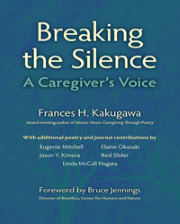
Breaking The Silence
Breaking the Silence is an essential book for Alzheimer's caregivers. It's a thoughtful and honest look into what caregivers face each day, coping with incredible pressure, anxiety, and difficult decisions. Frances weaves her poetry and that of six other caregivers together, along with journal entries and advice for the novice poet.
"...a book of enormous hope and transformation."
—Bruce Jennings Director of Bioethics Center for Humans and Nature New York, NY
"Breaking the Silence: A Caregiver's Voice is a powerful literary contribution and teaching tool to the field of gerontology."
—Cullen T. Hayashida, Ph.D. Director, Kupuna (Elder) Education Center Kapiolani Community College Honolulu, Hawaii --Kapuna Education Center
The warrior returns home.
At her feet ashes,, black ashes.
And Silence. Cold Silence.
Where are the voices
Of my ancestors?
Their songs, their stories?
The warrior's cries
Are swallowed by Silence.
A sparrow flies over her head.
Be still and listen.
A sudden gust of wind
Lifts a fistful of ashes,
Swirls and swirls them
Around her head,
Then over the tangerine trees,
Into the skies.
Where are the songs of my ancestors?
Songs of my mother,
Tales of my grandmother?
A second gust of wind
Lifts another fistful of ashes.
Be still and listen.
—Frances Kakugawa
-
Commentary:
In her second volume by and about caregivers of those stricken with Alzheimer's disease or other forms of dementia, Frances Kakugawa thought it important to share the hidden world of trying to attend the needs of another human being. Something we needed to know. We honor soldiers who we send off to preserve democracy or for whatever other reason we think justifies putting Americans in harms way. We honor the dead with obituaries for simply having lived. But caregivers, she noticed, were as invisible as the disease that claims so many victims, but rarely appears on the front pages, or gets medals for heroic efforts and sacrifice which it is called upon to make almost daily.
It wasn't enough. Alzheimer's remained a taboo subject best hidden away. Like the word 'cancer' was once regarded something nice people didn't mention, the less said about Alzheimer's, the better. If we didn't talk about it, if we pretended that there weren't millions of us that had to deal with this most debilitating of all diseases that robs the minds of its victims, then maybe it would just go away. It doesn't, and the first revelations of what it takes for ordinary people to confront this and care for those who sufferit hasn't gotten much notice either.
"Breaking the Silence" is her second for attention to this serious crises in caring for our elders. This time the author and five other caregivers bring their isolated lives into public view in order to break through the veils of silence and to remind us that any society that professes values of dignity and compassion for its citizens. "Breaking the Silence" stands as a landmark in the effort to present that case on behalf of the millions of unheard caregivers who have no voice and are lost in the silence that surrounds them.
Alzheimer's leaves me tilting at windmills.
Nothing to be done.
No plan to follow.
No hope. No cure.
I am powerless. I turn in my badge.
— Linda Nagata
A little later Linda will write,
Write, write, write.
The bitter emotions softened,
Turn into acceptance, peace.
Write, write, write.
To order this book:
from Amazon.com, click the book cover.
-
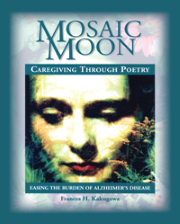
Mosaic Moon
Mosaic Moon is much more than an extraordinary collection of inspirational poetry. Here is a unique resource for anyone with a loved one suffering from Alzheimer's disease or other long-term illness. Created from poetry workshops conducted by the Alzheimer's Association Aloha Chapter, this writing tool for non-writers is brimming with ideas and techniques for finding solace in journaling and poetry. Designed for both individual caregivers and for support groups organizing workshops, Mosaic Moon offers hope, humor and a powerful antidote to the heavy burden of caregiving.
A unique approach to self-expression through poetry, Mosaic Moon: Caregiving Through Poetry is much more than an extraordinary collection of inspirational poems - a unique resource for those with loved ones suffering from Alzheimer's disease or other long-term illnesses. Created from workshops conducted for the Alzheimer's Association by poet and educator Frances Kakugawa, this writing tool for non-writers is also full of ideas and techniques for finding solace and creativity in journaling and poetry.
Written for family caregivers - and anyone else interested in the poetic process - Mosaic Moon offers hope, humor and an easily accessible introduction to the benefits of creative expression.
I was but a child
When I wrote my first line of poetry
That senselessly rhymed.
It would be my ticket
Out of God-forsaken Kapoho:
A ticket away from kerosine lamps,
Outhouses, battery-run radio.
And Pidgin English.
I believed it would be my ticket
To Greenwich Village, New York City,
Paris and Stockholm, Sweden.
Little did I know
That poetry would help me conquer
The debilitating disease, Alzeheimer's.
Way before those men and women in white,
In laboratorysanctionssanctuaries.
-
Commentary:
Poetry for getting well. Sometimes used as a tourniquet, sometimes as a placebo, writing and reflecting on poems can help to keep the disease of Alzheimer's from making a victim of the caregiver as well as the loved one. A moment away from the ordeals of caregiving can certainly lighten some of the burdens of constant attendence to someone's needs. Still, there is more to "Mosaic Moon" than that.
"Mosaic Moon" is really an instruction manual on how to use poetry to navigate many aspects of one's life. Don't quite know where you are? Lost your bearings? Confronting obstacles and uncertainty blocking your way? Poetry may be the best thing in your in medicine cabinet. Just splat it all out on a piece of paper, put it aside for a few days and then come back and take a look. If you do it in poem, in images and metaphors and the rhythms of your own mind and body, it is almost assured you will find the insights you need to get your bearings, correct your course and move forward. With a little practice anyone can write a poem. "Mosaic Moon" offers many suggestions and examples that to help you turn poetry into a useful companion and ally. In "Mosaic Moon", Frances Kakugawa will take you from a blank page to meaningful maps you can create for yourself that will get you on course. An indispensible navigation tool, especially for those who find themselves in uncharted waters.
For caregivers, who also happen to be poets, it's not all spontaneous splat of course,
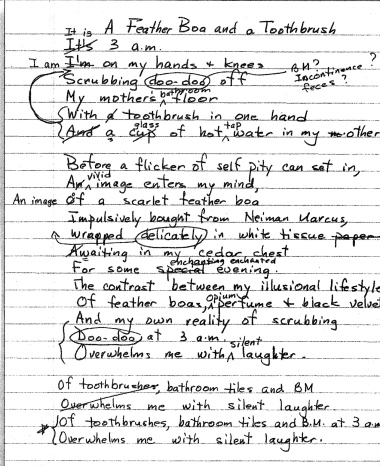 "
"
To order this book:
from the publisher, click here
from Amazon.com, click the book cover.
EDUCATION/TEACHING
-

Teacher
You Look Like a Horse
Veteran educator Frances Kakugawa presents an inside look at learning. At once poignant and hilarious, Teacher, You Look Like A Horse offers a wealth of personal insights into the educational process. Among them: the magic of discovery, the lifelong bond between student and teacher, the growing pains of childhood, and the serendipitous moments when student becomes teacher.
An entertaining memoir with a powerful message, the book also includes case studies and creative solutions to student-teacher issues. With lively anecdotes and revealing student commentary, this easy-reading resource was written for teachers, parents and anyone else involved in the care and education of children.
Commentary:
"You made a difference," "You changed me," "You saved me," are the words every teacher longs to hear. They are the words that confirm their time in and out of the classroom has not been wasted, that it has meant something, that the most difficult of all jobs has succeeded in its true purpose.
I got up a half hour early so I could french braid my hair. It was the "in" hairdo of the time. Feeling very chic and rather Parisian, I walked into my Kindergarten class.... One child stopped short in front of me and exclaimed, "Teacher, you look like a horse!"
-
Commentary (cont.):
Frances Kakugawa writes,
"In 'Teacher You Look Like A Horse' I wanted to convey that there are two types of relationships a teacher has with their students. A general one, the one that teaches subjects and provides students with skills they will need throughout their lives; and an individual one that teaches through respect and dignity in which the teacher shows each student the way to relate in a world of other people and to have confidence in themselves. It is a lesson that must be shown rather than said.
"I found in my teaching that reading and writing poetry and prose is a good way to develop the kind of relationship with students where dignity and respect can be demonstrated to any student. The shy ones, the scared ones, the troubled, the disinterested, the happy or agitated, all are receptive to the lessons of being heard and respected. The conversations that naturally arise in discussing poetry students read or write themselves offers a safe, fun, real and often challenging way to relate to a student rather than simply teaching them lessons. It is a curriculum that comes from within the child and also provides a welcome space for the teacher to be heard and seen as well.
"in a group setting, I found the classroom time spent with poetry can become a joyful and inspiring place to be, for myself as well as for the children. We use our imagination and creativity to learn and share together. In that setting, a teacher has no excuses for why some students learn and some don't.
"Yes," I might say, flipping my french braid, "sometimes I feel like a horse. Would you like to gallop around this table with me?" After our little gallop I might follow up with, "What makes you feel like a horse? Let's write poems about what makes us feel like a horse." And with that, our imaginations are off and running. We all learn because we are exploring ourselves along with the material, without judging one another.
"In my book, I've tried to bring enough examples of how this has happened during my forty years of classroom teaching so that others can employ the same skills in their own classrooms, and indeed in daily contacts parents or anyone have with children. You don't have to look like a horse to be an effective teacher. But if that's what you look like to some child, then its a perfect opportunity to play with the idea and see where it leads. Often, with any child, laughter will be a sure symptom you're headed in the right direction."
To order this book:
from the publisher, click here
from Amazon.com, click the book cover.WORDSWORTH
-
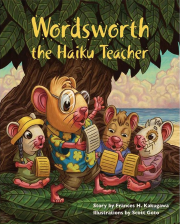
Wordsworth,
the Haiku Teacher
Something is terribly wrong. Wordsworth and his friends don't seem to be having adventures like they used to. In fact they don't seem to be doing much of anything at all.
Every day is about the same as yesterday. Wordsworth keeps writing the same poems over and over. On top of that, Wordsworth will be teaching a class about haiku poetry but he hasn't a clue how to teach it. He knows about haiku of course. After all he's a poet. But teaching? That's something he knows nothing about. Wordsworth's friends begin to notice they are just doing the same thing day after day.
They haven't had a new adventure in quite some time. To make matters worse, no one has seen or heard from Frances in a very long time. A really long time. Where could she be? She doesn't write, she doesn't text. Has something happened to her? Eliot, Akiko and Dylan can't even imagine an existence without Frances. In fact, they can't even imagine imagining anything without the help of Frances. What is to be done? Will imagination and poetry help get them through this adventure as it has in the past? We will just have to wait and see.
"Haiku is a perfect device to encourage children to look at the world around them instead of a computer screen in front of them. "Wordsworth the Haiku Teacher" is the perfect aid to help them to learn that important lesson" — Out_of_the_Loop Press
The sound of the rake
grating against the concrete
breaks the quiet dusk.
— fhk
-
Frost on the window,
snowflakes falling everywhere.
Warm words on this page.
— rs
Footlongs at the game,
sweet relish, onions, mustard,
yellow stains on new shoes.
— rs
On Hawaiian shores,
5-7-5 images
full of aloha.
— fhk
Haiku in good taste,
hiding the wildness of nature.
Mushrooms in season.
— rs
Pollen in the air,
yellow specks on the white page.
hai, hai, hai, HAIKU!.
— rs
NEW!To order this book:
from the publisher, click here
from Amazon.com, click the book cover.
-

Wordsworth The Poet
Wordsworth writes about rainbows made of butterflies and castles in the clouds. But all the other mice in the Hawaiian rain forest make fun of Wordsworth and his "silly" poems—he's a different, he's a poet. Until the day the sun disappears, and the sky rumbles, and the rain begins to fall and fall. That's when Wordsworth takes his pen in hand and shows the others how poetry can save the day.
In this heartwarming children's story by poet and educator Frances H. Kakugawa, young readers can learn the value of self-expression, then try writing their own poems about the world around them.
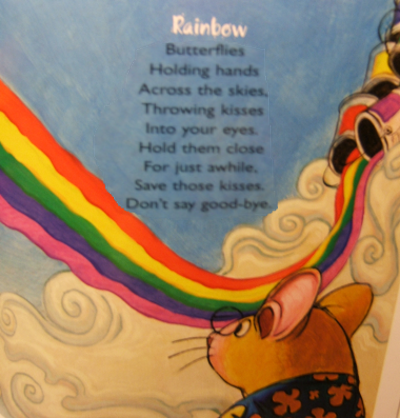
-
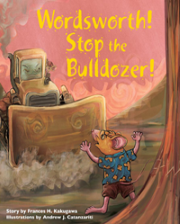
Wordsworth! Stop the Bulldozer!
There are so many changes happening in Wordsworth's life, his best friend Emily has moved away, a new girl from Japan named Akiko is sitting in Emily's chair at school and, worst of all, a bulldozer has invaded Wordsworth's special koa grove where he thinks up new poems. What should Wordsworth do?
"I would want someone to be nice to Emily," thinks Wordsworth. So he and his friends, Eliot and Dylan, invite Akiko to teach them about Japanese poetry. And what a good thing, too, because it is Akiko who has a clever idea to save the neighborhood trees from being knocked down.
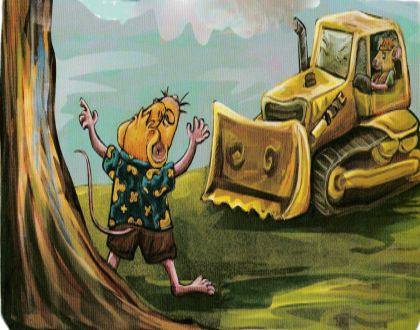
To order these books:
from the publisher, click here
from Amazon.com, click the book cover.
-
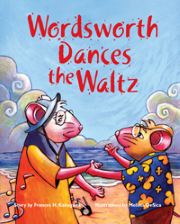
Wordsworth Dances
The Waltz
Wordsworth, the little Hawaiian mouse who loves poetry, doesn't understand why there is so much whispering around the house since Grandma came to live with his family. He remembers her last visit, when the house was filled with laughter, and he and Grandma danced around the room together. But now, Wordsworth and his siblings have to walk softly and be quiet so they don't disturb Grandma. In Wordsworth Dances the Waltz, children are introduced to the concept that as grandparents age, they may become different, and even forget important things. Wordsworth finds comfort in writing poems that express his confusion over the changes in his beloved grandparent and the fond memories he has of her more vibrant days. He wonders, "Now that shes losing her memory/She's still my Grandma, isnt she?" The answer, of course, is yes—nothing could ever change that. Wordsworth's poems help his family understand that Grandma would still like to do things she always loved—spending time with the family, laughing and dancing.
Wordsworth Dances the Waltz is dedicated to author Frances Kakugawa's late mother, Matsue, who was afflicted with Alzheimer's disease. Frances was her primary caregiver for five years; during that time she found that poetry and journaling helped to ease the rigorous burden of caregiving.
Wordsworth Dances the Waltz received the Bronze Award in the Best Book Overall category, as well as the gold award for Best Illustrated Children's Book from the Northern California Publishers & Authors (NCPA) group for books published in 2007.
Age level: 4 and up.
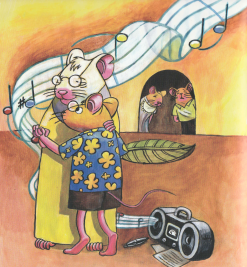
-
Commentary:
It was inevitable that two of Frances Kakugawa's passionate interests were to meet in a single book-her long interest in caring for those suffering from Alzheimer's, and her journey with a little mouse-poet whose five volumes of "Wordsworth the Poet series" cover a range values embraced by the Hawaiian term 'Aloha'. What could be more aloha than respect and loving regard for our elders despite any changes that may have befallen them through the symptoms of dementia. "Wordsworth Dances the Waltz raises the question as nothing else can,
"Now that she's losing her memory,
She's still my grandma, isn't she?"
Not surprisingly, this is the second volume in the Wordsworth series of children's books (with many serious lessons for adults as well) that directly touches on a serious problem of public health. In her "Wordsworth, It's In Your Pocket!" volume she offers a potentially powerful inoculant for the growing affliction of child addiction to social media and other digital activity.
In "Dancing the Waltz" we are similarly presented with a serious public health problem which needs to be addressed. The symptoms of this affliction include caregivers who are left unsupported and confused about how to regard a loved one who has become a stranger to them, families who abandon members to institutions hoping that they will be well cared for (can one be loved by a nursing home?), and professionals who have little to offer but symptomatic relief along with "you're doing a good job," or, "It's time to let go."
Wordsworth, armed with his important question, must now find out for himself why grandma has been excluded from family events, why others talk about her in whispers, and why her chair is empty chair at dinner. Might early bedtime readings of "Wordsworth Dances the Waltz" to our children, or inclusion in our school library collections, help to overcome these fear-bred reactions and avoid the abandonment of a good number of our parents and grandparents for want of any other way to deal with this disease?
Is it possible, if exposed early in our childhood to materials such as "Wordsworth Dances the Waltz" we won't need to go searching for the answer to Wordsworth's question. Perhaps we will find ourselves already equipped with the knowledge that the loved one who seems different is, indeed, still our grandma, or parent, or sibling, and deserves our affection, inclusion and love just as any other member of our family.
Of course she is still your grandma, Wordsworth, and if you can discover the waltz or story or hugs that are still there to share, then you will have no problem answering your question.
To order this book:
from the publisher, click here
from Amazon.com, click the book cover.
-
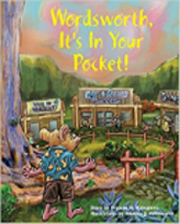
Wordsworth,
It's In Your Pocket
[Parents, seeking ways to help your child avoid addiction to digital games and social media? Putting "Wordsworth, It's In Your Pocket" on your child's bedtime story list may help to do that.]
Wordsworth has hardly seen his friends all summer. They have been too caught up in their electronic devices to pay attention to anything around them, and now they are tangled in wires and gadgets! A mysterious old mouse tells him that the secret to saving his friends is in his pocket — what does he have that can help?
Emphasizing creative play, imagination and the fun of the outdoors over the allure of video games, computers and cellular phones, this new Wordsworth adventure is a gentle reminder for families that it's important for young minds to unplug and enjoy real-world friends and activities. Wordsworth, It's In Your Pocket is the fourth book in the award-winning series of Wordsworth books featuring the poetry-loving mouse.
Wordsworth, It's In Your Pocket! awarded Best Children's Book for 2015 by Northern California Publishers & Authors (NCPA).
Age level: 4 and up.
The old mouse looked at Wordsworth and said, "Do you want to join them, Wordsworth? I have a brand new next-generation smartphone somewhere in the house. I also have a collection of video games. You can have them all. Free!". . .
No, thank you. I don't want your machines. I want my friends back."
-
Commentary:
[Health Note: The Surgeon General of the United States has advised that social media and digital addiction is a serious public health problem. It is worth noting that the Surgeon General's report provides several methods of intervention, but nearly all involve some type of parental intrusion or control over the activities of their children —setting computer hours, laying down usage limits, making restrictions on the types of digital activity, monitoring, pulling the plug, and similar constraints. Common sense tells us that children will find ways to ignore or circumvent these attempts to control their behavior. They always do.
"Wordsworth, It's In Your Pocket!" offers a non-intrusive approach to addressing this problem. If routinely included in the bedtime stories read to very small children, and made available to them in their home and school libraries, it may help to innoculate children against digital addiction long before symptoms begin to appear. In a non-preachy manner the story fully supports the idea that real world relationships and activites are far more rewarding than their online facsimiles.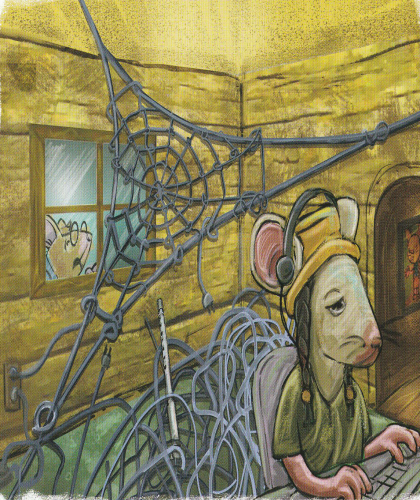
To order this book:
from the publisher, click here
from Amazon.com, click the book cover.
-
-

Age level: 4 and up.